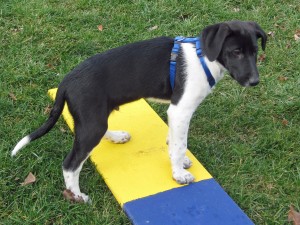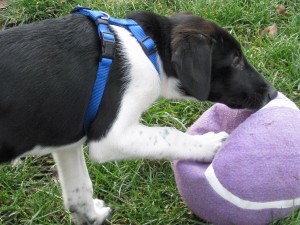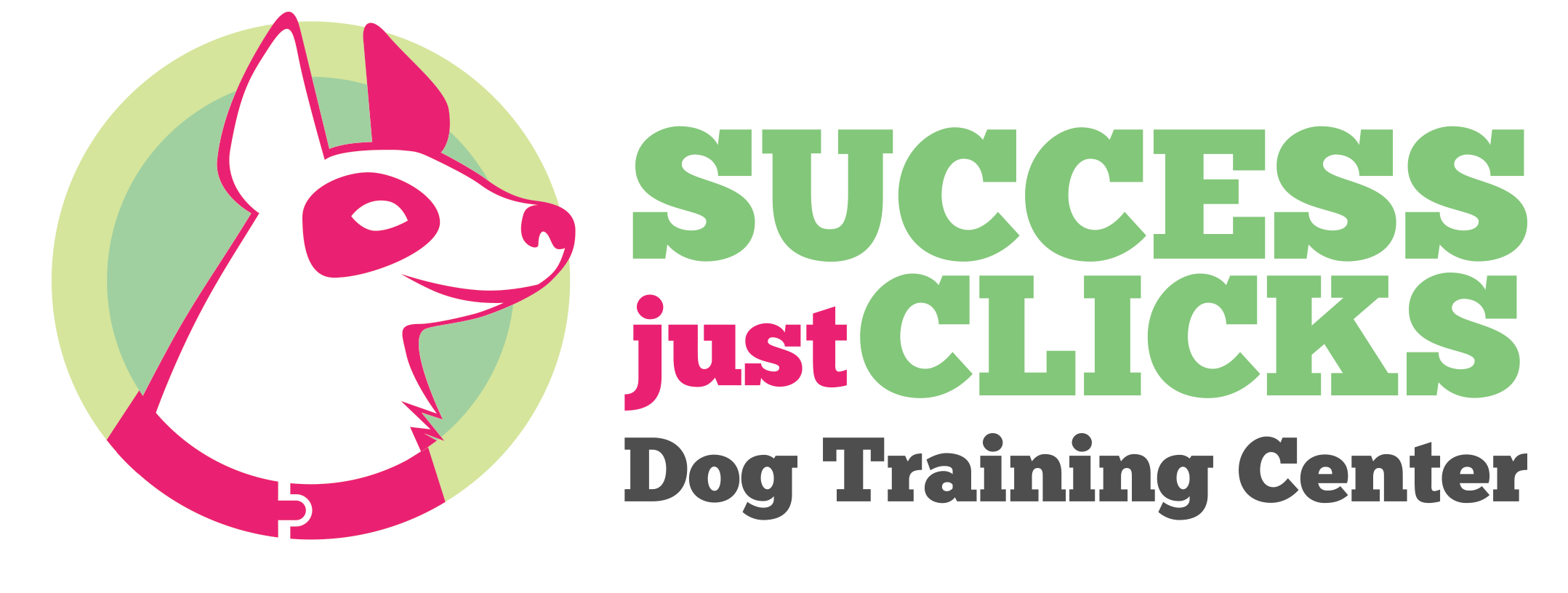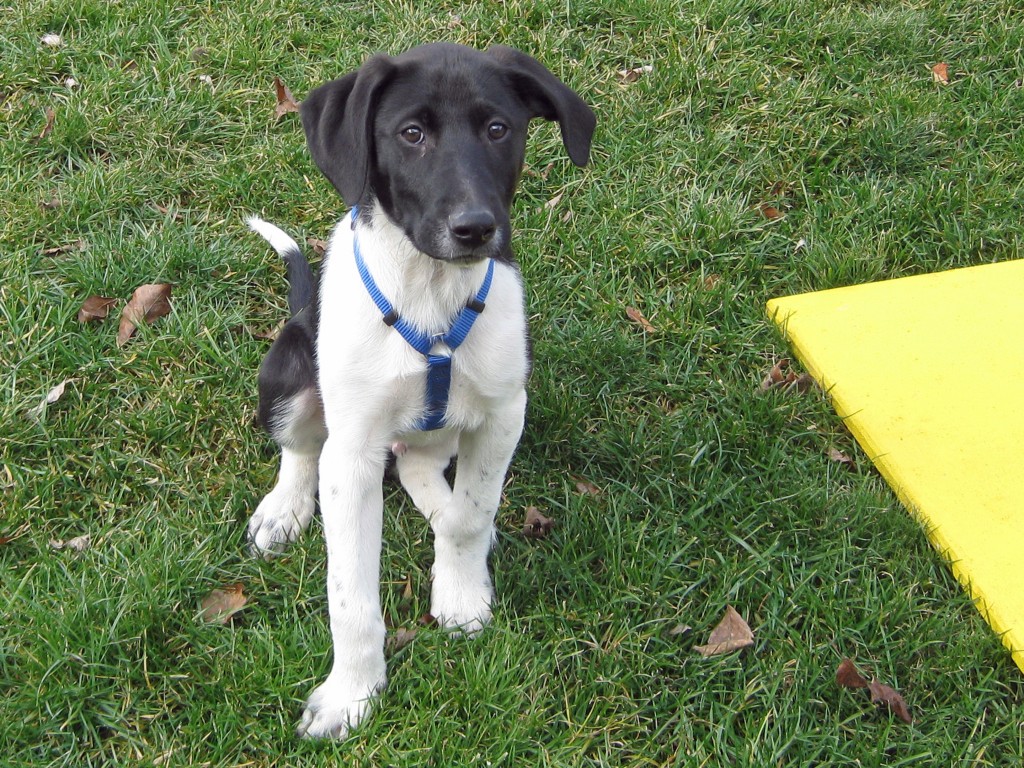Meet Jethro!! Newest foster dog extraordinaire!
Jethro is a nearly 10 week old Collie/German Shorthaired Pointer cross who is handsome as can be! He is a total mush and is getting more confident each and everyday!
 With a 10 week old puppy comes lack of sleep so posts for the next few weeks may be shorter than typical because … well if Jethro is going to get me up at 6 or 7 am, I cannot stay up until 3am writing.
With a 10 week old puppy comes lack of sleep so posts for the next few weeks may be shorter than typical because … well if Jethro is going to get me up at 6 or 7 am, I cannot stay up until 3am writing.
Onto the topic for today. I know most of my readers have adult dogs but you know there may come a time when you have to get back to the basics with either a new dog or a puppy.
Tena’s Tips for Successful Housetraining
 In general, it is my goal that Jethro not have any opportunities to rehearse unwanted potty behaviors. House training is about building a habit and preference for pottying outside. The more accidents inside, the more of a preference he may start to build for pottying in the comfort of the house; so prevention is really important. Most accidents are human error, not puppy mistakes. I think it’s important for humans to be accountable for their mistakes and not to blame or get frustrated with puppy. I know with Rio he had a grand total of 2.5 accident and was pretty reliable within about a month. Each one of his accidents were my fault–I learned from them and moved on. Here are the basic ideas under which I operate to house train puppies…
In general, it is my goal that Jethro not have any opportunities to rehearse unwanted potty behaviors. House training is about building a habit and preference for pottying outside. The more accidents inside, the more of a preference he may start to build for pottying in the comfort of the house; so prevention is really important. Most accidents are human error, not puppy mistakes. I think it’s important for humans to be accountable for their mistakes and not to blame or get frustrated with puppy. I know with Rio he had a grand total of 2.5 accident and was pretty reliable within about a month. Each one of his accidents were my fault–I learned from them and moved on. Here are the basic ideas under which I operate to house train puppies…
KNOW YOUR PUPPY’S POTTY DANCE–Before one can prevent an accident, one must be able to tell the signs of impending potty. I learned that the hard way. Jethro’s potty signals were very different from Rio’s in that his sniffing was more widespread and generalized compared to Rio’s. So while Jethro was sniffing around, I didn’t take that as a potty signal (since he’d just peed 65 minutes prior) because it was very generalized sniffing that wasn’t terribly focused. Well, after he started to pee on the floor, I interrupted it and he finished outside but the definitely taught me his potty signals. Once I knew what to look for, I was able to respond to those signals by taking him outside and rewarding him.
CONSTANT SUPERVISION–Really, constant. If you cannot be focusing on the dog, he/she should be crated (or if a dog is a little bit older or reliable, on a tether). This one is really important… even if you know the potty dance, if you aren’t supervising well enough you won’t see the dance and puppy will have practiced an undesired behavior. What this means, for me, is that if I’m intently watching a TV show, I’m writing a blog, I am reading a book, cooking dinner, taking a shower, or talking on the phone (intently), puppy would be chilling in the crate since he’s much less likely to have an accident in his crate.
CREATE A SCHEDULE–By getting the pup on a very predictable schedule, they learn that there are many opportunities to go outside to potty and are more likely to start to “hold it” as they get bigger. Another benefit to starting a schedule is that when you feed at set times, the puppy is out to play/get drinks at set times you are more able to predict when the puppy may have to go. Plus it’s very easy to methodically change the schedule as the puppy ages and is capable of controlling their bladder for longer amounts of time. When there is a predictable schedule, humans are proactive by taking the pup out regularly to potty outside before they even try to potty inside.
REWARD WHAT YOU WANT–I have a pink bathrobe with duckies on it hanging by the front door because it’s easier to slip on then a coat at 4 am when I’m groggy. Stuffed in both pockets are a two handfuls of puppy kibble so that when he potties outside, I’m able to heavily reward that behavior outside so it’s more likely to happen in the future. I really do not think it is advisable punish a puppy who has an accident for a wide number of reasons. First of all, a puppy having an accident is almost exclusively human error and secondly there is real risk of teaching the dog to not potty in front of you (either inside or outside). What this creates is a puppy who will sneak away to pee in some corner of the house (just as long as the handler isn’t there) or they will simply not potty in front of the handler, even when on a walk. The last thing a handler wants is a puppy who refuses to potty in front of them but who feels safe sneaking off to a quiet place in the house to potty.


I just got a 9 week old Rottweiler puppy this weekend. We go outside immediately when he wakes up. So far, my little guy doesn’t have any signs of impending potty. He’ll be running, then stop and pee. My strategy is to try going out frequently.
Congratulations on the puppy!! Can I expect to see him in class one day!? I think a schedule is so important for potty training. I pretty much have an alarm set for just under 2 hours so I know to take puppy out every about hour forty-five minutes (which is what I discovered is his ‘natural’ potty clock right now, unless sleeping through the night). This way he doesn’t really have the opportunity to potty inside since he’s going out at about the time he needs to (and luckily he takes every outside opportunity to pee).
Good luck with puppy and again, Congrats!!
Jethro is just so freaking cute! And what a breed combination! He’s going to be a blast. Congratulations! I can’t wait to read more about him as he grows.
If he grows up with some drive, he could be a REALLY NICE large breed sporting dog. He’s got long legs but a nice build… not too long bodied. He is just CRAZY cute!! Even my mom (who was not into having another foster pup right away) was smitten and snuggles him all the time–I SUSPECT she’ll be into fostering young puppies after this guy since she clearly LIKES the puppy stage and that’s about how long we’ll typically keep them. He really is a GREAT puppy!
I have him enrolled in the puppy class that starts tonight at the North Shore location. I’ll be enrolling Ellie in the Adult Basic II with you as soon as they publish it.
An alarm is a good idea! I’m going to have to try that. The biggest problem right now with going out is that he just wants to play and explore. I’ve tried to give him treats when he goes outside, but he doesn’t want them. I think maybe he’s still off-kilter from the traveling this weekend.
How excellent! Jethro is enrolled in Lillian’s Saturday puppy class at Crafton. I’ll email you as soon as it’s up on the web 🙂 .
I would take him outside without the other dogs to the same spot every time, give him 5-10 mintues to potty. If he potties YAYYY throw a party and give him some treats. If he doesn’t potty, he goes back inside into a crate for 10-20 minutes (depends on if he SHOULD have to potty, like after a 3hr nap or if he was just giving potty signals). I would repeat this until he potties and THEN he gets the food reward AND gets to play outside in the non-potty area.
Jethro is so cute I can’t stand it! I am sure it won’t take him long to find his forever home. I do think that recognizing the potty dance is the hardest part of housebreaking. I know I made my fair share of mistakes with Pearl.
He IS so cute … his ears are amazing! The potty dance is important to learn and if you are constantly watching them, i think it’s pretty easy to pick up (within a few accidents one becomes pretty vigilant of the possible signals and will start letting the dog out even if it MIGHT be a potty signal). If handlers aren’t watching closely they don’t pick up the little things and it may be many many accidents before they notice it